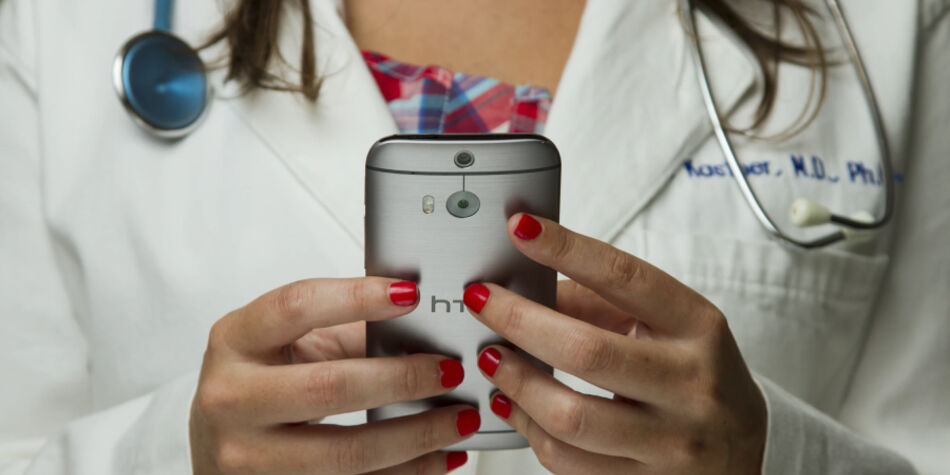The Future of Medical App Development
The introduction of mobile applications to the medical industry has radically changed users’ views about how to monitor medical conditions, diet, and nutrition quickly and effectively. In addition to simple calorie calculators and heart monitors, mobile applications can now check medical records that doctors make in hospitals.
In the foreseeable future, healthcare applications will continue to take a more active role in managing the medical responsibilities of attending physicians.
You may assume that healthcare applications are developed for patients only, but they are also actively used by physicians. Using mobile applications helps physicians monitor several aspects of their patient’s health. Some applications even allow doctors to directly conduct examinations of the patient via a smartphone.
Medical apps help diagnose various conditions, make all the necessary measurements, and receive test results much faster than some traditional tools. We may, therefore, assume that these devices will play a significant role in the next step for the medical industry.
The importance and necessity of these apps are hard to overestimate. Healthcare applications take a sound understanding of health responsibilities to a new level. One might even say, thanks to mobile applications, a revolution in the field of healthcare will happen a lot sooner than we ever imagined.
We defined that medical applications are something more than just apps for fitness and a healthy lifestyle. Now it’s time to determine what lies ahead for medical mobile app development. Before we answer this question, let’s examine the current trends of mobile app development in healthcare and the impact these applications, in general, have on the mediсal industry.
We all know that the main challenge for mobile app developers is to define the end user’s needs. Despite the fact that the medical industry is a complex area, the same rules, which usually define the concept of usability, apply here.
CATEGORIES OF MEDICAL MOBILE APPS
There are several directions in the development of medical mobile apps, but the main ones are patient-oriented apps and specialist-oriented apps.
MEDICAL APPS FOR PATIENTS
- Patient-oriented applications work directly with patients. They include pill reminder apps and doctor appointment apps. This category also includes fitness, diet, and nutrition applications. These are probably the most popular applications among common users.
- Other applications, such as patient portal apps and facility information apps, allow users to receive any information they need about a clinic and its services. Apps also give access to personal medical records via the internet.
Developers of such apps are constantly looking for new ways to improve the applications including the ability to collect and analyze information about patient’s health from several healthcare devices.
MEDICAL APPS FOR DOCTORS
The development of doctors-oriented apps is quite focused. These apps are intended to only be used by healthcare professionals to check a patient’s test results and track medicine and treatment effectiveness.
- A relatively new trend in this direction is the observation of the patient’s health in remote mode. Through the app, a doctor can monitor vital signs and symptoms a patient may have.
- Another unique trend is using an application and a special smartphone attachment to conduct an ECG right from the smartphone and send the results to the attending physician. The doctor can then share this information instantly with his colleagues. For remote consultation, a physician can also send patient data through a secured connection to another healthcare specialist.
All these benefits significantly simplify communication within the healthcare industry, allowing decisions to be made much quicker. This is particularly important when a patient’s life depends on quick results.
TELEHEALTH AND MHEALTH APPS
While analyzing all the examples above, you can see which tasks are most relevant for the medical industry now and what the development direction for future healthcare applications will be. Users have become more aware of their health with these applications. Also, patients are becoming more likely to meet with their doctor. They start to think of diagnosis at the first sign of a symptom, rather than waiting until the condition progresses and symptoms become more severe.
- An excellent example is an application that uses complex algorithms and a smartphone’s camera to analyze body moles to determine if it might be malignant. If it is suspicious, patients should seek medical attention immediately.
- Another great feature is healthcare apps that can now give patients online access to their test results. They can see any changes to the database and their personal account, reducing the risk of medical fraud. As we see in this case, mHealth application developers are taking care of patient safety as well.
- Medical applications break down the wall between doctors and patients. With the advent of mobile applications, communication between doctors and patients has become much easier and more convenient. Now, anyone can get a professional medical consultation right from their device allowing people from remote households to receive the same level of healthcare as those living in the big cities.
THE CURRENT STATE OF THE MEDICAL APP MARKET AND ITS FUTURE TRENDS
This year promises even more breakthroughs in the healthcare app industry. Developers will use modern medical standards to develop new and more accurate algorithms for healthcare applications. After all, data accuracy in medical applications is fundamental to their usefulness.
Medical applications are taking a permanent place in our lives. Moreover, individual users state that the use of medical applications has a positive impact on their health. Of course, it’s too early to say that it is a widespread phenomenon yet, but even now with the coronavirus spread the importance of mobile technologies and remote access to healthcare service has grown to extremes boosting a larger public awareness and making more people take advantage of the benefits that medical applications can provide for monitoring our health. And this trend will only strengthen.
It’s important to understand that healthcare apps aren’t just planners or reminders. These are assistants, who are responsible for analyzing our health and informing us of any changes if something goes wrong. We are sure that you agree that this is an important aspect, which continues to grow as the IT technologies grow.
CPRIME’s EXPERIENCE IN MEDICAL APP DEVELOPMENT
To develop healthcare applications in our company, we draw from all of the newest technologies and best practices of the medical industry and the latest medical mobile app development trends. This allows us to produce projects that enhance the user experience and comply with data security requirements like, HIPAA and similar.
Cprime provides healthcare software development services and has a lot of experience developing applications. Here in Cprime, we are happy to contribute to our clients’ mission and help the healthcare industry to benefit from novel and proven information technologies.
Our experts are prepared to cooperate on your wearable app development for healthcare project implementation at any stage of your product’s lifecycle be it business analysis phase, UX/UI design, architecture development, building hardware interfaces, integration with third-party systems, existing software upgrades, testing or NetOps support.
Cprime’s healthcare software projects portfolio comprises:
- HIPAA-Compliant online communications platform allowing healthcare providers to securely communicate with their patients and other professionals via computer or mobile devices;
- A computerized system for brain blood vessel examination;
- Pain and sensory evaluation system software;
- Web and mobile applications for wellness and healthcare tracking.
Contact us at learn@cprime.com to learn more.


